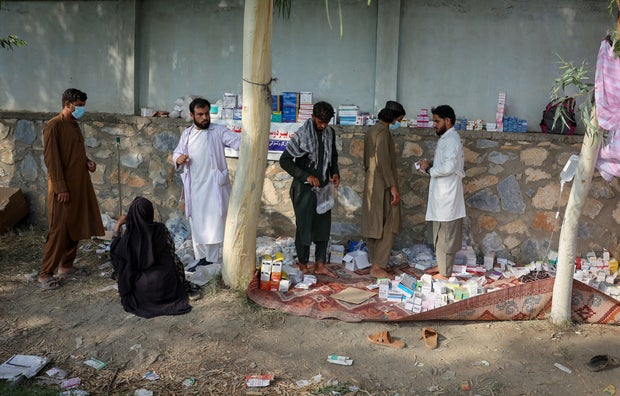The death toll from the devastating earthquake that hit eastern Afghanistan jumped to at least 2,205 on Thursday, four days after the temblor toppled homes as people slept. Afghanistan’s Taliban rulers said 3,640 more people were confirmed injured from the quake, which struck the country’s Kunar and Nangarhar provinces at about 11:40 p.m. local time on Sunday night.
Aid workers and first responders were still racing on Thursday to find any survivors, Taliban officials said.
Amid the destruction and with help slow to reach many parts of heavily-impacted Kunar province, survivors have buried many of the dead in mass graves, in line with Islamic tradition that dictates quick burials.
“That is my daughter, the other is my sister. This grave is my brother’s, and that one is my mother’s and that is my father, along with my brother,” Wazir, a 25-year-old resident, told Afghanistan’s TOLO News network, pointing to a small row of fresh graves.
The worst-hit villages are in remote parts of the province, and many roads have been blocked by landslides triggered by the temblor. On Wednesday, the Taliban administration’s Ministry of Interior shared a video with CBS News showing police and first responders working to clear a path by moving large rocks with their bare hands.
WAKIL KOHSAR/AFP/Getty
Some rescue workers have walked for miles to reach the affected areas.
Some emergency crews have been flown in by helicopter, but in some affected villages, the rough terrain makes it impossible for helicopters to land, and the Taliban’s Minister of Defense said it was sending commandos down by rope to help people.
“One team had to walk for over 12 miles to reach villages cut off by rock falls, carrying medical equipment on their backs with the help of community members,” the Save The Children charity said in a statement.
The United Nations’ World Health Organization said Thursday that it was scaling up its emergency response in Afghanistan and warned that the number of dead and injured was still likely to rise over the coming days, as it is feared entire families have been buried under rubble and not yet accounted for.
“More than 6,782 homes have been destroyed in the earthquake, leaving thousands of people homeless and in harsh conditions. Hospitals are overwhelmed with the influx of severely injured patients, many in need of urgent surgery and critical medical care,” the WHO said.
The earthquake struck mountainous and remote parts of Afghanistan, and there have been significant aftershocks, driving many families to sleep out in the open and far from their homes, most of which were not built to withstand earthquakes despite the region being prone to seismic activity.
The disaster struck as Afghanistan was already struggling through a humanitarian crisis.
The Afghan government, along with international aid organizations, have launched an appeal for donations to help the survivors. According to the Norwegian Refugee Council, local resources in Kunar have been stretched to breaking point.
SAYED HASSIB/REUTERS
“Communities in the valleys have lost almost everything — their families, homes, livestock, and vital water channels. In the aftermath, makeshift camps are sheltering 50 to 100 women and children per tent, with no access to proper wash facilities,” the charity said in a statement. “Families with children are deeply traumatized, with some children having been trapped under rubble for several hours before being rescued.”
The Taliban’s official spokesman shared several bank account numbers seeking private donations, saying any funds would go to help those in need. On Wednesday, Minister of Foreign Affairs Amir Khan Mutaqi called on the country’s diplomats abroad to seek aid from their host nation’s governments, charitable organizations, and well-wishers.
Suhail Shaheen, the Taliban’s ambassador in Qatar, told CBS News the Foreign Minister had instructed Afghan envoys to open condolence books at embassies and to explain the situation and the urgent needs of the quake victims.
“We have given details of the situation on ground; the rest is for the others to decide about their assistance.” Shaheen told CBS News.
A number of countries have come forward to offer aid funding, but given the extent of the damage, much more will likely be needed.
The fact that many foreign powers, including the U.S. and most other Western nations, have refused to recognize the Taliban as Afghanistan’s legitimate government since it retook control in 2021 will make securing the needed emergency funding more difficult, according to analysts.
“The earthquake is another reminder that the people of Afghanistan suffer from not having a government recognized at the U.N. A number of international aid mechanisms such as World Bank financing would (otherwise) have activated to support the vulnerable,” Torek Farhadi, an analyst, development economist and former senior advisor at the IMF, told CBS News.

